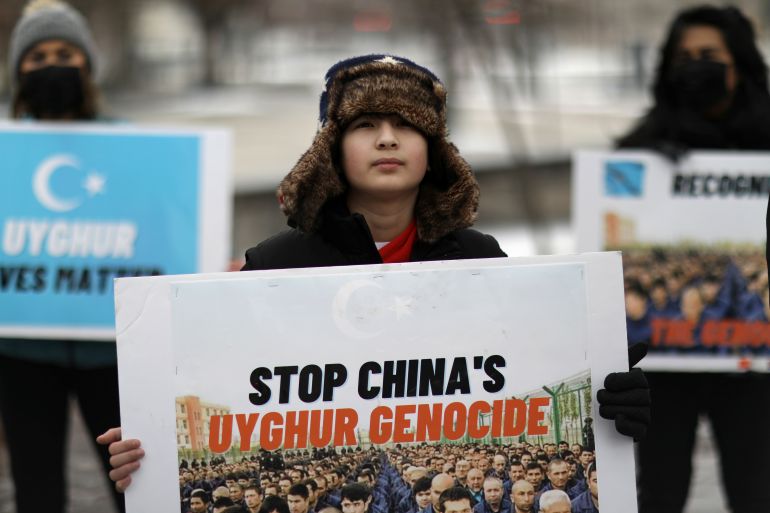Canada’s parliament says China’s treatment of Uighurs is genocide
Non-binding motion comes amid increasing pressure on Prime Minister Justin Trudeau to take harder line against China.

Canada’s parliament has passed a non-binding motion that says China’s treatment of its Muslim Uighur minority constitutes genocide, heaping pressure on Prime Minister Justin Trudeau’s government to do the same.
The motion, sponsored by the opposition Conservative Party, passed by a vote of 266-0 in the House of Commons on Monday, though Trudeau and nearly his entire cabinet abstained.
Keep reading
list of 3 itemsTrump administration says China committed Uighur ‘genocide’
Holocaust Memorial Day: Jewish figures condemn Uighur persecution
The measure was also amended just before the vote to call on the International Olympic Committee to move the 2022 Winter Olympics from Beijing if the treatment continues.
“More than one million Uighurs and other Turkic Muslims are or have been in camps. The testimonies we’ve heard from witnesses and survivors [have] been horrifying,” Conservative Party leader Erin O’Toole told reporters after the vote.
“There’s real suffering going on in China. There’s a genocide happening and Canadians, while we’re free traders and I’m very proud to be a free-market party, our values are not for sale,” he said, when asked about potential economic impacts of the motion.
Human rights advocates and United Nations experts have said that at least one million Muslims are imprisoned in camps in China’s remote western region of Xinjiang.
China has denied abuses and has said its camps provide vocational training and are needed to fight extremism.
Chinese foreign ministry spokesman Wang Wenbin said on Tuesday the motion “disregards facts and common sense”, adding that Beijing had “lodged stern representations” with Canada.
Cong Peiwu, Chinese ambassador to Canada, rejected the Conservative Party’s motion and said “there is no so-called ‘genocide’ in Xinjiang at all.”
“A few people in Canada and some other western countries are talking about upholding values, but one important part of the values should be: respect facts and stop spreading disinformation and even lies,” Cong said in a statement posted on the Chinese embassy’s website on Saturday.
The ambassador also urged Canada to “stop interfering in China’s internal affairs by any means, so as not to cause further damages to China-Canada relations”.
But Trudeau is under pressure domestically to take a harder stance against China.
Relations between Ottawa and Beijing deteriorated in December 2018 when Canada arrested Meng Wanzhou, an executive with Chinese telecommunications giant Huawei, on an extradition request by the United States, where she is wanted on fraud charges.
China arrested two Canadians – former diplomat Michael Kovrig and businessman Michael Spavor – soon thereafter and accused the pair of spying.
Canada, the US and 56 other countries this month endorsed a declaration condemning the political detention of foreign nationals around the world.
The administration of former US President Donald Trump, on its last full day in office, said China had committed “genocide and crimes against humanity” against the Uighurs in Xinjiang.
Last month, the United Kingdom accused China of human rights violations amounting to “horrific barbarism” against the Uighurs.